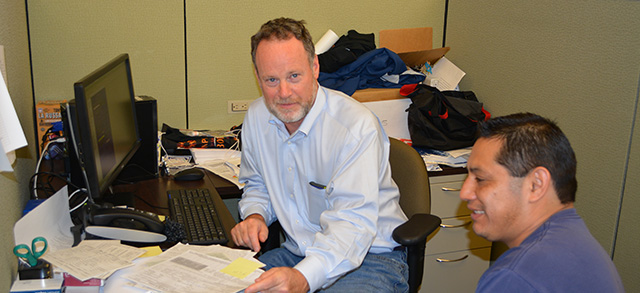 The stacks of paper are piled even higher than usual on Max Moy-Borgen’s desk today, his phone buried beneath pages emblazoned with years from the early George W. Bush years.
The stacks of paper are piled even higher than usual on Max Moy-Borgen’s desk today, his phone buried beneath pages emblazoned with years from the early George W. Bush years.
It seems the MEDA Tax Services Program Manager is busy doing a client’s taxes way back to the year 2000. Moy-Borgen enlisted Tax Volunteer Granger Tripp (photo left, with client, Carlos) to come back to Plaza Adelante and assist in this Herculean task—a task that needs to be done today.
What’s the rush? It has to do with one client in dire need of MEDA’s Free Tax Preparation services.
Carlos came to the United States from Mexico as an 18-year-old in search of a better life. As he nervously sits in MEDA’s offices today, the 41-year-old finds himself facing imminent deportation, despite his having lived in this country for the majority of his life.
With a court date next week, Carlos’ lawyer suggested he file as many years of back taxes as possible. The expert cook–who rumor has it makes a mean burger and delectable pizzas–has worked in San Francisco restaurants for over two decades. It’s just that Carlos’ immigration attorney fears the mere three years in back taxes that had been done in the past would not be strong enough evidence of long-time residence in the States.
Getting taxes prepared can be cost prohibitive. Just a few weeks ago, Moy-Borgen had a client come in who shared the shocking story that his uncle in San Diego had paid $26K to get 14 years of back taxes done. Without the necessary funds to pay a professional such potentially exorbitant fees, Carlos finds himself at MEDA today, with nothing but an Individual Taxpayer Identification Number (ITIN) and a ray of hope.
 Regrettably, just a short time ago there would have been an issue doing these back taxes as far back as needed. Things have now changed for the better, as the IRS’ recent regulation change translates into all Volunteer Income Tax Assistance (VITA) sites’ volunteers now being able to legally prepare taxes beyond the year for which they are individually certified. States Moy-Borgen, “This is important because the training and certification are no longer available and the tax law hasn’t historically changed too much for low-income families. So, only current-year certification is necessary.”
Regrettably, just a short time ago there would have been an issue doing these back taxes as far back as needed. Things have now changed for the better, as the IRS’ recent regulation change translates into all Volunteer Income Tax Assistance (VITA) sites’ volunteers now being able to legally prepare taxes beyond the year for which they are individually certified. States Moy-Borgen, “This is important because the training and certification are no longer available and the tax law hasn’t historically changed too much for low-income families. So, only current-year certification is necessary.”
MEDA Policy Manager Gabriel Medina explains the greater significance of this IRS policy change as follows: “Max Moy-Borgen and I have recently been meeting at Instituto Laboral de La Raza, a nonprofit resource center that provides legal services for the working poor. Their database of clients, who have received wage-claim adjustments, spans several years. With the new IRS ruling, it allows the clients to file adjusted tax returns to claim additional tax benefits over that same period. This can triple a tax return for an individual client. MEDA’s average tax return this past season was $1,570!”
Medina’s calculation comes from the number of clients served by MEDA and its 120 tax volunteers, plus the fact that over $5.25 million in refunds was returned to clients at its free VITA sites.
Continues Medina, “MEDA is collaborating with Instituto Laboral de La Raza, which wins more wage claims with the Labor Commissioner than any other agency in California, to help their clients receive additional tax return income that their employers wrongly withheld. One idea is to have a MEDA volunteer find referrals from La Raza’s database, to see who might be in need of these services. Every free legal service agency could find additional income for their clients by sending them to MEDA’s Free Tax Preparation Program.”
In the long term, this IRS regulation change could transform lives for many clients.
One much-relieved client named Carlos today showcased the possibilities.






